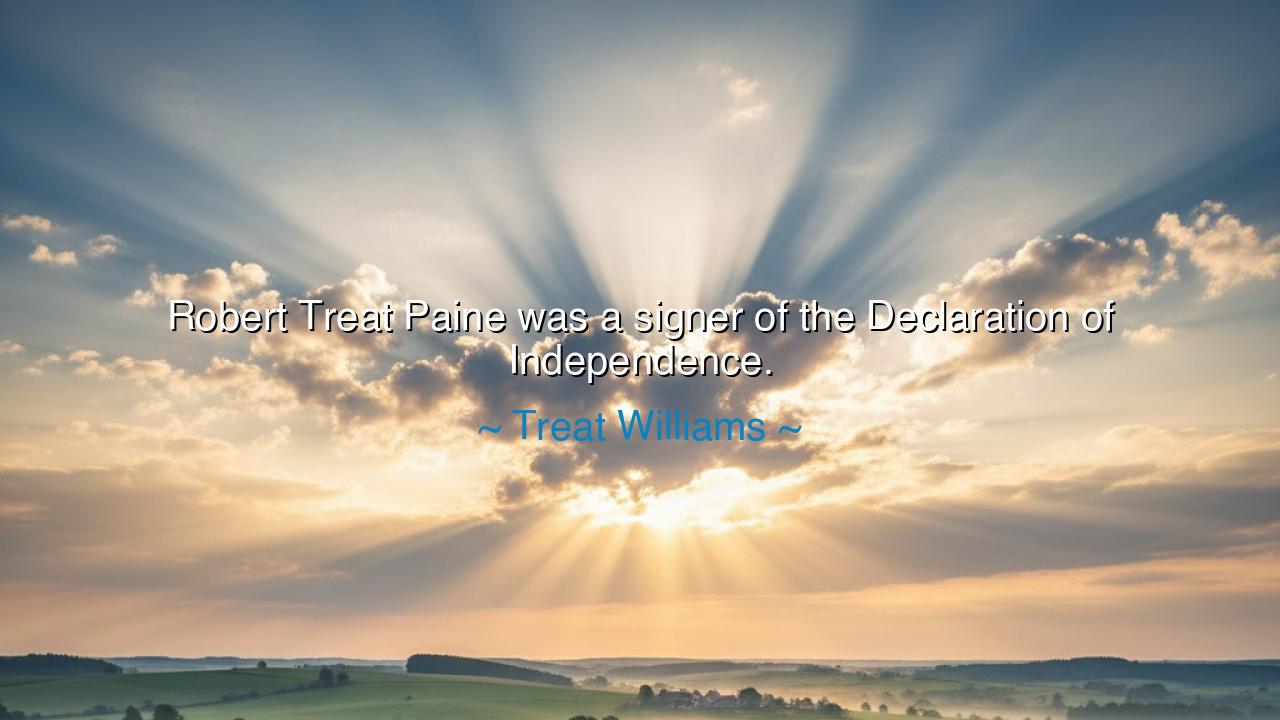
Robert Treat Paine was a signer of the Declaration of






When Treat Williams said, “Robert Treat Paine was a signer of the Declaration of Independence,” his words may seem, at first, simple — a statement of lineage and fact. Yet within that simplicity lies a profound meditation on heritage, courage, and the weight of legacy. It is not merely a reminder of history, but an invocation of the bloodline of freedom — a lineage not of privilege, but of principle. By speaking of Robert Treat Paine, one of the lesser-known yet steadfast signers of America’s founding document, Williams was invoking the spirit of the Revolution, and acknowledging that the fire of liberty runs not only through parchment and ink, but through the living memory of those who still carry its name.
The origin of this quote lies in Williams’ own family history. The actor, known for his depth of character and humanity both on and off the screen, was a descendant of Robert Treat Paine, a man who risked everything to give birth to the American nation. In uttering those words, Williams was not boasting of ancestry; rather, he was recognizing the burden of inheritance — that to descend from those who stood for truth and independence is to be called, in one’s own time, to the same courage. It was as if he were saying: “I remember where I come from, and I strive to honor it.”
To understand the weight of Paine’s name, one must return to that sacred summer of 1776, when thirteen colonies, trembling between rebellion and ruin, gathered to sign a declaration that would alter the destiny of mankind. Robert Treat Paine, a lawyer from Massachusetts and a man of stern virtue, affixed his name to the document knowing that it was, in essence, a death warrant should the Revolution fail. Like his fellow signers, he chose principle over safety, conviction over comfort. The ink he laid upon that page was more than ink — it was an oath to future generations, a promise that freedom, though costly, is worth every drop of courage.
Treat Williams’ remembrance of this ancestor carries the same moral gravity that the ancients placed upon lineage. In olden times, men and women would speak not merely of who their forebears were, but of what they stood for — of their virtue, their honor, and their sacrifice. To be descended from a man like Paine was not a matter of pride alone, but of responsibility. For what good is ancestry if it does not inspire action? What use is noble blood if it runs cold? Williams’ words remind us that the inheritance of freedom is not a treasure to be hoarded, but a torch to be carried — each generation lighting the path for the next, lest the world fall again into darkness.
And yet, his statement also carries a humility that mirrors the spirit of his ancestor. For Robert Treat Paine was not among the most famous of the Founders; he did not seek glory, only justice. His service was quiet but vital — he helped craft laws, he sought fairness in the courts, and he lived by a creed of civic virtue. In speaking his name aloud, Williams brings to light a truth long forgotten: that freedom is sustained not only by heroes whose names we know, but by countless others whose names we have forgotten. Every revolution, every great change, depends as much on the steadfast and the silent as on the celebrated.
This reflection leads us to the deeper lesson that Treat Williams was, perhaps unknowingly, imparting: that each of us stands upon the shoulders of those who came before — and each of us is called to be a foundation for those who will follow. We may not all sign declarations, or lead armies, or craft nations, but we can still live in a way that honors the same ideals. Integrity, courage, and the defense of truth are not the property of the past; they are the duties of the present. To remember those who fought for freedom is to renew our obligation to preserve it — not in words, but in deeds.
So, my children of the future, take this teaching to heart: the legacy of the brave is not a story to be told, but a call to be answered. Whether your ancestors were founders or farmers, their courage lives in you. When you stand for justice, when you speak for what is right even when it costs you, you, too, sign your own Declaration of Independence — from fear, from silence, from conformity. In remembering the name of Robert Treat Paine, Treat Williams was not looking backward, but forward — reminding us that freedom is never finished, and that the ink of liberty must be renewed in every generation, through the hearts and hands of those who still believe.






AAdministratorAdministrator
Welcome, honored guests. Please leave a comment, we will respond soon